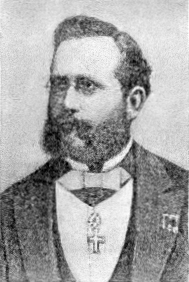Auguste Kerckhoffs
You can help expand this article with text translated from the corresponding article in Volapük. (July 2012) Click [show] for important translation instructions.
|
Auguste Kerckhoffs | |
|---|---|
 | |
| Born | 19 January 1835 |
| Died | 9 August 1903 (aged 68) |
| Nationality | Dutch |
| Alma mater | University of Liège |
| Known for | Kerckhoffs's principle |
| Scientific career | |
| Fields | Cryptography, linguistics |
| Institutions | HEC Paris |
Auguste Kerckhoffs (19 January 1835 – 9 August 1903) was a Dutch linguist and cryptographer in the late 19th century.
Biography
[edit]Kerckhoffs was born in Nuth, the Netherlands, as Jean Guillaume Auguste Victor François Hubert Kerckhoffs, son of Jean Guillaume Kerckhoffs, mayor of the village of Nuth, and Jeanette Elisabeth Lintjens.[1] Kerckhoffs studied at the University of Liège.[2] After a period of teaching in schools in the Netherlands and France, he became a professor of German language at the École des Hautes Études Commerciales (Paris)[3] and the École Arago.[4]
Principles
[edit]He is best known today for his two-part paper published in 1883 in Le Journal des Sciences Militaires (Journal of Military Science) entitled La Cryptographie Militaire (Military Cryptography). These articles surveyed the then state-of-the-art in military cryptography, and made a plea for considerable improvements in French practice. They also included many pieces of practical advice and rules of thumb, including six principles of practical cipher design:[5]
- The system should be, if not theoretically unbreakable, unbreakable in practice.
- The design of a system should not require secrecy, and compromise of the system should not inconvenience the correspondents (Kerckhoffs's principle).
- The key should be memorable without notes and should be easily changeable.
- The cryptograms should be transmittable by telegraph.
- The apparatus or documents should be portable and operable by a single person.
- The system should be easy, neither requiring knowledge of a long list of rules nor involving mental strain.
The best-known is the second of his six principles, also known as Kerckhoffs's principle. It can be understood as the idea that the security of a cryptosystem must depend only on the key, and not on the secrecy of the algorithm used for encryption or any other part of the system.[6]
Volapük
[edit]In 1885, Dr. Kerckhoffs became interested in the constructed language Volapük, and for several years was a leading member of the Volapük movement, and Director of the Academy of Volapük. He published several books on the subject and introduced the movement to France, Spain, and Scandinavia through a series of public lectures.[7]
References
[edit]- ^ "Geboorteakte Kerckhoffs, Jean Guillaume Auguste Victor F.H., 19-01... (Electronic Birth Record of Auguste Kerckhoffs)". www.archieven.nl (in Dutch). Sociaal en Regionaal Historisch Centrum voor Limburg. Retrieved 26 November 2022.
- ^ Petitcolas, Fabien A. P. (2011). "Kerckhoffs' Principle". In van Tilborg, H.C.A.; Jajodia, S (eds.). Encyclopedia of Cryptography and Security. Boston: Springer US. p. 675. doi:10.1007/978-1-4419-5906-5_487. ISBN 978-1-4419-5906-5. Retrieved 26 November 2022.
- ^ "August Kerckhoffs: the father of computer security - History". china.exed.hec.edu. HEC Paris. Retrieved 26 November 2022.
- ^ Kahn 1996, Chapter 8.
- ^ "About La Cryptographie Militaire". www.petitcolas.net. Retrieved 26 November 2022.
- ^ Savard, John J. G. (2003). "A Cryptographic Compendium: The Ideal Cipher". www.quadibloc.com. Retrieved 26 November 2022.
- ^ Lafarge, Paul (1 August 2000). "Pük, Memory: O Fat Obas". The Village Voice. New York, NY. Retrieved 26 November 2022.
Bibliography
[edit]- Kahn, David (1996). The Codebreakers: The Comprehensive History of Secret Communication from Ancient Times to the Internet. Scribner. ISBN 0-684-83130-9.
External links
[edit]- Kerckhoffs, Auguste (28 July 2018). La Cryptographie Militaire, Ou, Des Chiffres Usités En Temps De Guerre: Avec Un Nouveau Procédé De Déchiffrement Applicable Aux Systèmes À Double Clef (in French). Creative Media Partners, LLC. ISBN 978-0-270-77837-3. Retrieved 26 November 2022.
- Caraco, Jean-Claude; Géraud-Stewart, Rémi; Naccache, David (2020). "Kerckhoffs' Legacy". Cryptology ePrint Archive. Paper 2020/556. Retrieved 26 November 2022.
